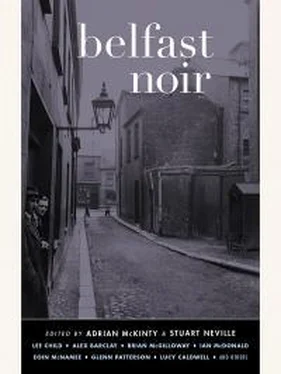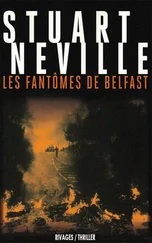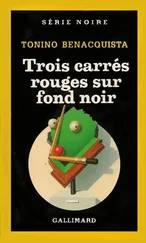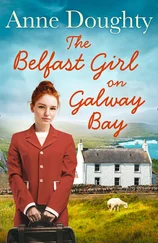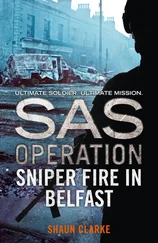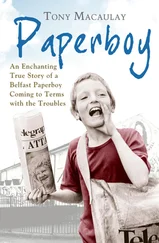“Is that what you told him?”
“No, of course not. I said those people died for equality and that’s what we’ve got.”
McCarthy leaned over and patted O’Gorman’s hand. “Look, Joe, as I said, I’ve no interest in this stuff, but even I know that’s bullshit. Youse spent decades going on about a United Ireland and now youse pretend it was all about having road signs in Irish. Am I right?”
O’Gorman lowered his voice. “Yes and no. We were tired, we had lost, and we had to pretend we’d won. And I for one am grateful as it got me out of jail after three instead of ten years. But Marty’s been reading about Irish history since 1916 and he’s on the side of the ones who never compromised.”
“Is it a good idea to take him to commemorations then? Aren’t they mostly of people who died fighting?”
“How can I stop now? It would break his heart.”
McCarthy shrugged. “You’re stuck then. You’ll have to hope he discovers girls. Or boys. Now for God’s sake, lighten up and let’s talk about where we’ll go on holiday. I’d say Tel Aviv, but from what I’ve seen about how Sinn Féin view Israel, it’d probably have you court-martialled. Is Barcelona more like it?”
* * *
Mrs. O’Gorman was delighted to see her brother-in-law. “I was just passing, Maria, and wondered if there’d be time for a cup of tea and a yarn.”
When they had settled at the kitchen table and caught up on general family news, there was a brief silence. Then he said, “And Marty?”
“Doing well at school, but he spends most of his free time upstairs at the computer so I don’t see much of him.”
“Have you any idea what he looks at, Maria?”
“How would I know? He wouldn’t tell me. And anyway, he doesn’t want anyone to know. There was a scene when Conor was over last week and wanted to look something up. Marty said his computer was his private property and no one must ever touch it.” She smiled. “It was so good of you to buy it for him. You’re too generous. That boy worships you, you know.”
Depression settled on O’Gorman. “I’d prefer if he’d have more to do with people his own age than an oul’ fella like me.”
“Go on with you, Joe. Aren’t you a fine man and wouldn’t any woman be proud to have you? Time you found one and settled down and reared your own children.”
“I’m a bit busy for that at the minute.”
“So you’ll be picking Marty up on Sunday again? Where are youse off to this time?”
“Just Ardoyne.”
“It’s for another wee lad, isn’t it? Marty’s got a new photo of a lad in a leather jacket.”
“That’ll be Thomas Begley. Remember the Shankill Road fish shop twenty years ago? His bomb went off early.”
Mrs. O’Gorman crossed herself. “God have mercy on their souls. There were a lot of them, weren’t there?”
“Bootsy Begley and nine others.”
“Some mothers’ children” she said automatically. “Well, I hope the weather keeps fine for youse.”
* * *
“I’ve got to give all this up, Paddy. It’s not just that I can’t get through to Marty but I’m wondering myself if there was any point to all that dying for Ireland. What did we achieve?”
Paddy McCarthy threw his arm around O’Gorman. “Living for it’s certainly a lot more fun.”
“Marty wouldn’t agree. All the way back he was reciting what was on the plaque. Ending with: It takes courage and devotion to your people to take the hard road to freedom . A quote from Seamus Twomey.”
“Never heard of him.”
“He was a hard bastard, so he was. Did terrible things when he ran the Belfast Brigade. But Marty thinks he was great. He wouldn’t have sold out , he said.”
“So he really does agree with those dissidents.”
“He won’t let me use the word. Says they’re the people who’ve kept the faith and it’s Sinn Féin who are the dissidents. He had some long quote from Patrick Pearse about how you should never compromise.”
“Doesn’t sound good, Joe. Are you afraid he’ll join up with those gutties?”
“I’d say he’s too odd for them to take on. He’s no team player. That poor lad Begley was a bit simple, but he’d have followed orders all right. Anyway, it’s my hope they wouldn’t have him. But I’ve tipped off a few of the lads I can trust to keep an eye out for him hanging round with anyone suspicious.”
* * *
Marty had intensified his researches into his band of heroes and had identified Bobby Sands as the greatest of them. He had long been familiar with the huge portrait of him on the side of the Sinn Féin shop on the Falls Road, and had absorbed the accompanying quote: “Everyone, Republican or otherwise, has their own particular part to play. No part is too great or too small, no one is too old or too young to do something.”
Having read a lot about Sands on the dissident websites, Marty had come to the definite conclusion that Sands hadn’t died for Sinn Féin to be governing a part of the United Kingdom.
“We must see our present fight through to the very end,” he had said, and for Marty that meant a united Ireland. He cried out in anger and frustration when he read Sinn Féin leaders saying the war was over. How could it be? How could they betray Bobby like that?
Gradually, Marty came to realise that the part he must play was to target members of the apostate Sinn Féin party. His inspiration was Thomas Begley, who had intended to eradicate the leaders of the Catholic-killing Ulster Defence Association that Saturday afternoon. He’d had bad information—which was why he’d got civilians instead—but Marty was doing his own briefing. He identified a forthcoming commemoration in the Milltown graveyard that was guaranteed to have at least one member of parliament and three members of the assembly. And with the help of his pocket money from Uncle Joe and instructions from the Internet, he had the materials and the know-how to build a bomb and the rucksack to put it in. On a long canvas he had carefully written out and illustrated Pearse’s line, “Life springs from death; and from the graves of patriot men and women spring living nations,” which was now decorating the top of the wall facing his bed and which he looked at last thing before he switched off the light. I’m going to die for Ireland , he would tell himself in the watches of the night. And my name will live forever .
Marty knew that Uncle Joe disagreed with him, but he didn’t want him hurt so he rang him to say he had too much homework to do that Sunday and couldn’t go, and Uncle Joe said that was fine by him as he’d a sick friend he urgently needed to visit.
“Great news on two counts,” O’Gorman said to McCarthy. “Marty’s putting school work ahead of freeing Ireland—which gives me hope he’s cooling a bit—and we can have a lazy Sunday together after all.”
* * *
Marty left the house while his mother was at Mass and joined the parade as close to the front as he could get. He felt vulnerable on his own, but he wore his headphones, which helped him block out disturbing sounds. He was halfway to Milltown when his mother rang her brother-in-law to say she’d come home to an empty house and to ask if Marty was with him.
“No. Wasn’t he doing homework? Maybe he’s gone to the library.”
“It’s not open on Sunday.”
“Or the shops?”
“He won’t go to the shops except on a Thursday.”
“Is he not answering his phone?”
“It’s in his bedroom. And Joe, he didn’t lock it. That never happens.”
“I’m sure he’s just gone for a walk. He’s a big boy, Maria. Don’t worry, he’ll be back soon.”
O’Gorman wandered to the kitchen window and tried to think what would make his nephew behave so out of character. “I don’t like it, Paddy. When Marty says he’s going to do his homework, homework is what he does.”
Читать дальше
